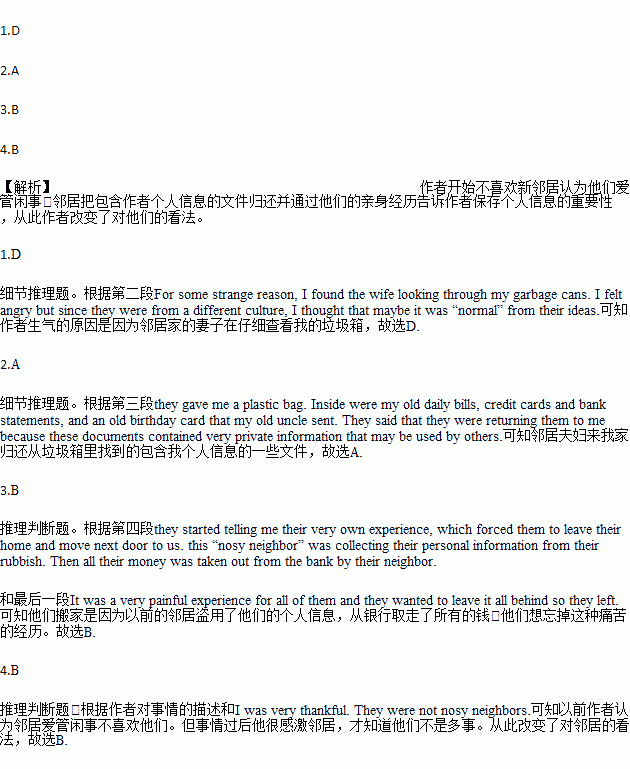题目内容
I live in a city, and I like quiet life. I hate nosy (爱管闲事的) neighbors but it’s very unlucky that I had one for myself. They moved in a couple of months ago and although I never felt that they were a strange family, I’ve always hated the way they get “too close” to me, my house, my garden , and even my garbage cans.
, and even my garbage cans.
One day, my neighbors were mowing their lawn (草坪). My garbage cans were near their lawn. For some strange reason, I found the wife looking through my garbage cans. I felt angry but since they were from a different culture, I thought that maybe it was “normal” from their ideas.
That afternoon, the couple knocked on my front door. When I opened, they gave me a plastic bag. Inside were my old daily bills, credit cards and bank statements, and an old birthday card that my old uncle sent. They said that they were returning them to me because these documents contained very private information that may be used by others.
I’ve heard of it before. I asked them how those documents can be used by others and they started telling me their very own experience, which forced them to leave their home and move next door to us. The wife told me that she never destroyed the bills. They also had a “nosy neighbour” who looked through their garbage cans which they actually thought was pretty strange. Little did they know that this “nosy neighbor” was collecting their personal information from their rubbish. Then all their money was taken out from the bank by their neighbor.
It was a very painful experience for all of them and they wanted to leave it all behind so they left. I was very thankful. They were not nosy neighbors. They simply didn’t want us to experience the same thing that they did.
1.What made the author angry?
A. His neighbors came to knock at his door at night.
B. His neighbors were mowing their lawn one morning.
C. His neighbors got too close to his own home.
D. His neighbor’s wife was looking through his rubbish.
2.Why did the couple come to the author’s home?
A. To return the documents to the author.
B. To get to know each other better.
C. To introduce themselves to the author.
D. To borrow some money from the author.
3.The neighbors moved to live next door to the author because .
A. they no longer had money to live in their former home
B. their personal documents were used by their former neighbor
C. they didn’t want to live in such a noisy home as before
D. they thought the author was much better than their former neighbor
4.Which of the following can we infer from the last paragraph?
A. The author was kind and helpful to the neighbors.
B. The author changed his idea about his neighbors.
C. The neighbors didn’t have enough money.
D. The neighbors had to move from place to place.


 . Turn your back on too many rules
. Turn your back on too many rules